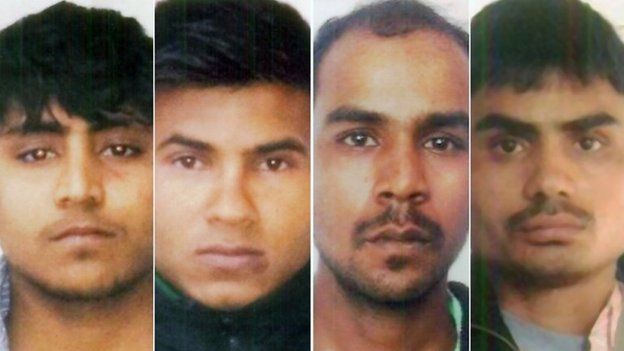Indians react to Delhi bus rape documentary
- Published

There has been a huge reaction in India to a British-made documentary about the 2012 gang rape and murder of a female student in Delhi.
The BBC documentary was broadcast in the UK on Wednesday night, but it was unavailable in India. However using the internet, people across the country were able the watch the programme.
More than 3,000 people from India got in touch on the BBC's WhatsApp service in just three minutes to share their thoughts. Here is a selection of their comments.
"It is not anti-India or anti-men"
Sharavi Kshirsagar shares her opinion on Delhi rape documentary.
"The BBC cannot play with the personal lives of others"
Prabhjot Cheema responds to the BBC documentary about rape in India
And others changed their minds after watching the documentary
Other WhatsApp users in India contacted the BBC to share their views:
Ajinkya Lakhe "The documentary merely reinstates the indecent attitude some Indian men have towards women. Indian society needs to change its attitude so that there will be no such documentary filmed in future".
Tulika Saxena "The documentary puts the mentality of Indian men out in open. The point that politicians and rich men are also involved in such crimes but are not prosecuted was raised but not challenged well. I do not think the programme should be banned. These kind of bans are not a good trend for our country".
Krishna Agarwal "I strongly feel the documentary would be an eye opener for all sections of Indian society. It would help us to look into the minds of a criminal. We should see this as a chance to understand their psychology".
Christina Vaz "I am surprised that the authorities are going after the documentary rather than acting on the offensive words of a man who has committed such a heinous crime. I am surprised that a lawyer can say he is OK with killing his daughter if she brings shame on his family. They are men who will never value women as equal or otherwise. As a woman in India with a daughter this is truly terrifying and disturbing. Where is the democracy when free speech is shut down and perpetrators of hate are allowed to live and justify their crimes?"
Ravi Asrani "I am not in favour of the broadcast of the interview. The rapist's views of women do not represent the views of a vast majority of men across the world, not only in India. Granting such views a platform on a respected channel will have a negative impact by legitimizing such obnoxious thoughts and encouraging those who agree with them. Please do not allow this, it will hurt the cause of dignity and chivalry".
Ravi Kant "A documentary on such a harrowing and gruesome incident should not be banned. It is important for us to accept the skewed and depraved attitude which has impregnated our society. We shall only be able to cure it if we are willing to comprehend its cause".
Jaideep "The documentary presents the truth. Everyone must see it to understand the pain of the victims and their families and the societal environment that allows men to treat women as objects. Dispensation of timely justice is one step forward. Education, and empowerment are long term solutions".
Nisha Chainani "Freedom of speech in India is like raising a male child and a female child within the same family - with two separate sets of rules! Freedom of speech is the home under whose roof certain expressions are fully permissible but certain expressions need to be curbed".
Ashok Kumar Singh feels the documentary was irresponsible, "The BBC enjoys disturbing the social and political balance of other countries. That is why the BBC interviewed a gang rape convict and broadcast it before time despite a ban by the government of India".
- Published5 March 2015
- Published4 March 2015
- Published4 March 2015